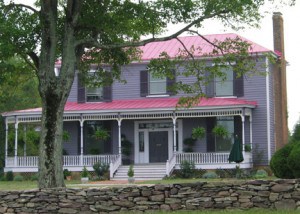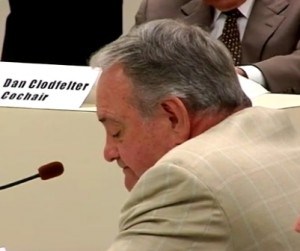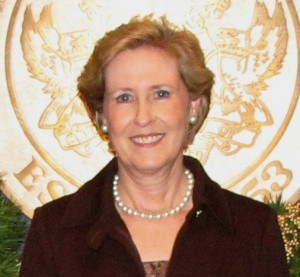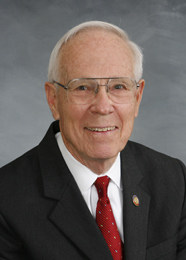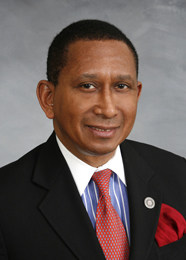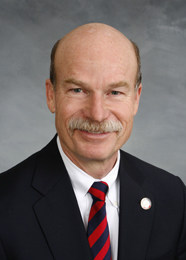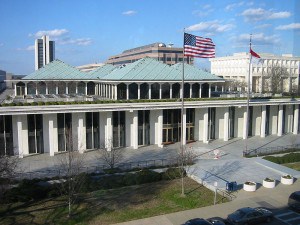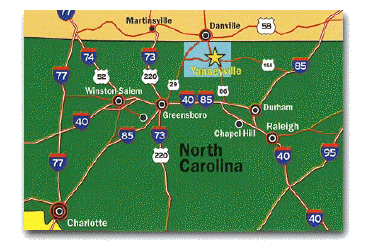
Although not too far from Winston-Salem and Greensboro, Caswell County has a population of just over 23,000 people
In a painful display of callous disregard for the broadband needs of rural North Carolina, where half the state’s population lives, nine Republicans and two Democrats on the House Public Utilities committee voted down a bill to deliver service to 60 percent of Caswell County that currently goes without.
HB2067, introduced by Rep. Bill Faison (D-Orange/Caswell) would have allowed the rural county to provide broadband service to unserved residents and businesses. What Rep. Faison did manage to put in HB2067 was initiative towards 21st Century technology. The bill would have authorized Caswell County to install better technology, both up and down, where Centurylink offers slow DSL as the only option. In introducing the bill, Faison explained that recent broadband data showed only 40 percent of Caswell County had access to broadband.
Already suffering from the exodus of textile jobs that used to provide an economic base for the area, the failure to obtain broadband has proven disastrous to the work of the county’s 21st Century Group, trying to restore Caswell County’s economy with a higher-tech future. Six years of work was blocked by CenturyLink — the local phone company and 11 legislators, who told residents they don’t deserve anything better than they already have (which is often nothing.)
Without HB2067, Caswell County cannot even apply for federal stimulus broadband grant funds because the state law doesn’t provide specific authority to deliver the service. Faison’s bill would correct that oversight and encourage public/private partnerships to get busy bringing broadband to the region.
CenturyLink and its top lobbyist Steve Brewer would hear none of it — Goliath was afraid that David would install better technology and force Centurylink to upgrade or hit the road.
Brewer was given more than half the available time for discussion about the proposed bill to fill the ears of committee members with half-truths.
CenturyLink, Brewer claimed, was more than willing to work with the county to provide the kind of speed its business park needed, yet failed to mention its long history of refusing to expand service to unserved areas. Brewer’s claim that 70 percent of Caswell County is served by CenturyLink doesn’t mean the company offers broadband to all of those customers. His further claim that 90 percent of those areas include equipment that is “DSL capable” also doesn’t mean those areas are providing the service today, just that they could… someday. Many factors can disqualify a potential customer from getting DSL service, especially in rural areas where line quality is not always the best.
Faison sought to explore exactly what Brewer defined as “broadband” service. Brewer claimed DSL service offered anywhere from “1.5 to 6Mbps,” admitting speeds decline with distance and is untenable more than three miles from the telephone company switch facility.
Of course, Caswell County’s large rural expanse puts many of the unserved beyond the maximum distance DSL can work without additional equipment. Many rural areas that can get DSL are typically offered between 768kbps-3Mbps service. Caswell County is so rural, it met the Rural Utility Service’s (RUS) classic definition of an underserved community. That allowed the county to technically qualify for first round federal broadband grant funding.
Unfortunately, legislators are not always as informed as they need to be to recognize statements riddled with loopholes and asterisks.
For instance, Rep. Daniel McComas (R-New Hanover) asked whether he could get high speed Internet over a phone line. Although Brewer answered yes, what qualifies as “high speed” was left unanswered, as was exactly how many Caswell County residents requested DSL service, only to be refused by CenturyLink. Yes, you can get DSL broadband over a phone line — but that doesn’t mean you will in Caswell County.
“The only definition of high speed Internet in North Carolina is from a statute from 10 years ago,” Faison noted. “You would have to admit that what was high speed Internet 10 years ago is not high speed Internet today.”
Just as the call for a vote was made, Brewer delivered an uninvited closing argument — probably unnecessary since no consumers were invited to speak on the issue. If you don’t have broadband in Caswell County, 11 legislators on that committee weren’t interested in hearing from you anyway.
Brewer said the bill was completely unnecessary, because “federal broadband grants were no longer available,” and besides, it was unfair competition for the county to deliver broadband service better than what CenturyLink provides. Of course, broadband grants -are- still available from the RUS, and few on the committee probably understood the irony of a phone company demanding that Caswell County not be allowed to deliver quality broadband service CenturyLink refuses to provide.

The substitute Committee bill would have protected CenturyLink from their fears of "unfair" competition by not allowing the county to build out broadband service where CenturyLink already provides it if it was not better service, but the company remained adamantly opposed to the county providing broadband service even in areas where they refuse to deliver it themselves for fear they would have to offer real broadband to Caswell County.
CenturyLink also claimed the county would have ‘secret insider information’ about CenturyLink’s every move through the permit process. The glacial pace of the phone company’s broadband expansion is hardly a secret to the residents who live there. Besides, permits are not required for the phone company to work in their own right-of-way. Unlike cities who control the rights of way in their corporate limits, the state owns and controls the rights of way going through the unincorporated parts of the County. Brewer’s comments were intended to scare legislators, not inform them. It was a flat out lie.
The vote illustrates the disconnect many in the state legislature have about broadband. Most of those in favor of the of the bill were Democrats mostly from rural sections of the state. Two of the “no” votes came from Democrats in urban Mecklenburg County, which includes the city of Charlotte. Representatives Beverly Earle and Becky Carney already have several choices for broadband service where they live. Shame on them for condemning their rural neighbors in the north to a broadband backwater.
Mecklenburg County legislators were sure in a big hurry a few years back to do the bidding of AT&T, opening the doors to their kind of competition with statewide video franchising. U-verse, which is available in parts of Charlotte, was supposed to put a stop the relentless rate increases and deliver competition. So far, they’ve managed to sign up around 13,000 residents out of a potential 4 million plus in North Carolina, and the rate hikes just keep on coming.
The Republicans on the committee voted lock-step against the bill, even those from rural regions of the state. Most of them are grateful recipients of big telecom money or are not running for re-election. None of them can be bothered to ponder better broadband for their constituents unless it comes from a company cutting them a campaign contribution check.
When the vote was over, AT&T’s lobbyist Herb Crenshaw warmly shook McComas’ hand and congratulated him for a job well done. AT&T’s next check to McComas’ campaign fund will likely be bigger than the $500 he collected during the first quarter of this year.
The hit job on the broadband needs of rural Caswell County was complete.
The Members of the House Public Utilities Committee Voting Against Better Broadband for Caswell County & The Reasons Why
…and these amounts are just from the 1st quarter of 2010!
 Rep. Harold J. Brubaker (R-Randolph) — Big Bucks Brubaker ran to the bank with $4,000 from AT&T, $4,000 from CenturyLink, $2,000 from Time Warner Cable, and $2,000 from Verizon.
Rep. Harold J. Brubaker (R-Randolph) — Big Bucks Brubaker ran to the bank with $4,000 from AT&T, $4,000 from CenturyLink, $2,000 from Time Warner Cable, and $2,000 from Verizon.
Rep. Hugh Blackwell (R-Burke) — Blackwell accepted $500 from AT&T and $250 from Time Warner Cable.
Rep. Becky Carney (D–Mecklenburg) — AT&T and Time Warner Cable both cut checks for $500 each for Ms. Carney.
Rep. Beverly Earle (D-Mecklenburg) — She’s nice at half the price, with a grateful CenturyLink cutting a check for $250.
Rep. W. Robert Grady (R-Onslow) — Zippo. He’s not running for re-election.
Rep. Jim Gulley (R-Mecklenburg) — Nada. He’s not running again either.
Rep. Julia Howard (R–Davie/Iredell) — She gets around. AT&T found her $500, CenturyLink provided a cool $2,000, and Time Warner Cable did even better with $2,500.
Rep. Linda Johnson (R-Cabarrus) — A double mint. AT&T $500, Time Warner Cable $500.
Rep. Daniel McComas (R-New Hanover) — AT&T gave him $500, Time Warner Cable doubled that with $1,000.
Rep. Tim Moore (R-Cleveland) — Walking around money — AT&T $500, Time Warner Cable $500.
Rep. Wil Neumann (R-Gaston) — AT&T $500, but thanks to this year’s hefty rate hike, Time Warner Cable could afford $1,000 for Mr. Neumann.
Representatives Who Supported Rural North Carolina’s Need for Better Broadband, Voting For HB2067
Rep. Bill Faison (D-Orange, Caswell)
Rep. Kelly Alexander, Jr. (D–Mecklenburg)
Rep. Angela Bryant (D–Nash, Halifax)
Rep. Pricey Harrison (D-Guilford)
Rep. Marvin Lucas (D-Cumberland)
Rep. Nelson Cole (D-Rockingham)
Totals for 2010 (so far) for Telecom Contributions in the North Carolina General Assembly
AT&T $72,740
CenturyLink $51,750
Time Warner Cable $20,450
Verizon $10,500
(All figures are from the North Carolina State Board of Elections website, from candidates filings.)


 Subscribe
Subscribe